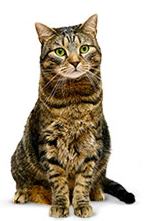Senior Pets
As veterinary medicine and dietary research has improved, so has the quality of our animals’ lives. This means that pets are living longer now than they ever have before. One consequence of this is that just like with us, the passage of time takes its tolls on our pets. You may notice that your once-frisky feline seems to have slowed down, or your once-rambunctious pooch is more hesitant to chase after the ball.
“Old age is NOT a disease.”
Being aware of the natural changes that can occur as your pet enters their Golden Years ensures that you both enjoy this final stage in their lives to the fullest!
How Will I Know if my Pet is Getting ‘Old’?
The first signs of old age are often decreased activity levels with more tendency to sleep. Other signs and symptoms include deterioration of hearing and sight, grey hair, joint stiffness, and muscle loss. As with humans, the aging process will vary for each individual (indoor cat vs. feral/outdoor cat, large breed dogs vs. small breed dogs), but generally the age of reaching seniority is 7 years for small dogs and cats, and 6 years for larger dog breeds.
What Can I Do?
- Check-ups come twice a year – As your pet ages, regular checkups with your veterinarians become more important than ever. In fact, at this stage in your pets’ life, a thorough examination every 6 months is highly recommended, not just when their vaccines are due. This will ensure your veterinarian knows your pet well (physically and behaviourally) and any disease processes are caught as soon as possible.
- Keep your vet informed – Telling your veterinarian about any noticeable changes in your pets’ physical condition or behaviour assists in early diagnosis and treatment of a disease processes. After all, you know them best!
- Continue to vaccinate– Just because your pet is getting older and their energy levels require less time spent outdoors, does not mean that vaccines should be skipped. Public Health is still finding increased incidences of not only Rabies (a vaccine that is mandatory by law), but Leptospirosis as well (a bacteria shed in the urine of raccoons, skunks, etc., that is transmittable to your pets and family members). Your pets’ immunity may also be compromised in their senior years, making protection against diseases even more important! Talk with your vet about customizing a vaccine regimen for your pet to ensure proper protection.
- Put a healthy diet on the menu – As they age, your pets’ nutritional needs change. You may find that even though your pet is eating less, they are still putting on weight. This is due to their decreased metabolism and activity levels. Weight loss diets are a common occurrence in our senior pets. Their increased weight adds to joint discomfort as well as health issues. As every pet has different nutritional needs, your vet is your best resource for customizing an ideal diet for your pet. An ideal senior diet should include (but is not limited too):
- Appropriate and digestible protein levels – helps maintain muscle mass.
- Sources of glucosamine – helps nourish joints.
- Antioxidants and Vitamin E – helps maintain a healthy immune system.
- Annual Bloodwork – Having annual bloodwork ran on your pet not only can help us diagnose an illness or disease but can catch a disease and/or illness in its early stages. We can track the function of your pets’ internal organs (like the kidneys and liver) over the years and note when there is a decrease in productivity or an abnormality signifying a disease. This is a great tool for your veterinarian to know what is ‘normal’ for your pet!
- Joint supplementation and physiotherapy – Like us, as we get older our joints become stiffer and we aren’t as limber as we once were. We can take glucosamine supplements, ibuprofen, acetaminophen, and do yoga, stretch, go to the chiropractors or do physiotherapy exercises at our convenience. Your pet CAN NOT receive ibuprofen or acetaminophen as these medications are TOXIC and can kill your pet, and they cannot take themselves to the doctors and get relief from their pain. That is where you come in. You and your vet can discuss joint supplements for long-term use to treat or prevent arthritic changes, they can prescribe pain and/or anti-inflammatory medications that are safe for your pet, and you yourself can perform exercises on your pet to assist in joint comfort and flexibility. Here are vet approved videos on how to perform therapeutic stretches and exercises on your pets at home:
- Passive Range of Motion Exercise:
- Sit to Stand Exercise:
What Shouldn’t I Do?
As much as we want to help our pets’ feel better while saving ourselves a few bucks, there can be some severe consequences to our good intentions:
- Self-Diagnosis and Prescribing—Your pet should always see a veterinarian for an official diagnosis and to be prescribed a veterinary grade medication that is not only safe but effective. Medications prescribed for a previous illness or injury may not always be effective for the next, therefore feel free to call the clinic and speak with your veterinarian. We know that every circumstance is different and that’s why we love to hear from you so we can ensure your pet is getting the proper care!
- Giving your pet ‘human’ medications— Although some medications are similar in animal medicine and human medicine, a lot are harmful to our furry friends! Drugs like acetaminophen, ibuprofen, hydrogen peroxide, bismuth, etc., can cause more harm than good. Instances of extreme illness, long-term health issued and death is unfortunately all too common after owners give their pets’ these harmful medications.
- Ignore obvious signs of disease – It’s not uncommon for a pet to develop an illness or disease in their old age but never is it normal. Changes in sight, hearing loss, inappetence, extreme lethargy, masses and growths, dental disease, etc. should never go unseen by a veterinarian. Masses can (and should) be removed, a dental cleaning should be performed, and loss of hearing or sight can be secondary to diseases.
Meet Maxwell
He is constantly curious, a lover of all adventures found in a cardboard box, a diligent front porch protector, and the feared hunter of all fallen twigs…

He is also 8 years old with undiagnosed arthritis. It’s now too painful to hunt twigs.
If your pet is coming up to their senior years, or if they are showing signs of aging, please contact the clinic to schedule a wellness visit with one of our caring veterinarians. We can answer all of your questions in regards to the changes your pet is going to face, and what you can do to help keep them comfortable and healthy.



